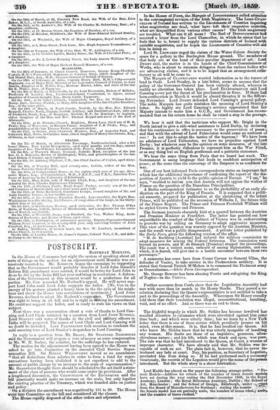POSTSCRIPT.
SATURDAY MORNING.
In the House of Commons last night the system of speaking about all sorts of things on the motion for an adjournment until Monday was ex- tensively resorted to. Mr. ROEBUCK began the campaign by suggesting that as the Government would probably dissolve if Lord John Russell's Reform Bill amendment were curried, it would be better for Lord John to do as he did by the India Bill last year and bring in resolutions. A disloca- tion of the Government at this moment would be a misfortune for all parties. Mr. Cox seconded Mr. Roebuck's appeal. He will never sup- port Lord John until Lord John supports the ballot. [Mr. Cox in the energy of his gesture planted a heavy blow in the the eyes of his neigh- bour and threw the House into convulsions of merriment.] Lord Jona RUSSELL declined to adopt Mr. Roebuck's suggestion. The Government was right to bring in its bill and he is right in !gloving his amendment. He could not support the ballot, and is ready to state his views on that subject. Next there was a conversation about a vote of thanks to Lord Can- ning and Lord Clyde initiated by a question from Lord JOHN RUSSELL. Lord STANLEY said votes of thanks to the civil and military officers in India will be proposed. The names of Lord Clyde and Lord Canning will no doubt be included. Lord PALMERSTON took occasion to condemn the cold sneering tone of Lord Stanley's despatches to Lord Canning.
In reply to a question from Mr. BRADY, Sir STAFFORD NORTHCOTE said the Government will propose a vote of money as some compensation to Mr. W. H. Barber, the solicitor, for the sufferings he has endured.
The motion for the adjournment been agreed to the House was asked to go into Committee on the amended Civil Service Super- annuation Bill. Sir HENRY WILLOUGHBY moved as an amendment " that all deductions from salaries in order to form a fund for super- armuations having been abolished it is not expedient to add to the amount of public charge by an increase to the scale of superannuation." Mr. GLADSTONE thought there should be scheduled to the act itself a state- ment of the class of persons who would come under its provisions. After a lengthened discussion, the CHANCELLOR of the EXCHEQUER said the bill practically would Lake no increase on the scale, but only legalize the existing practice of the Treasury, which was founded alike on justice and policy.
On a division the amendment was negatived by 131 to 29. The House went into Committee on the bill and considered all the clauses.
The House rapidly disposed of the other orders and adjourned.


































 Previous page
Previous page